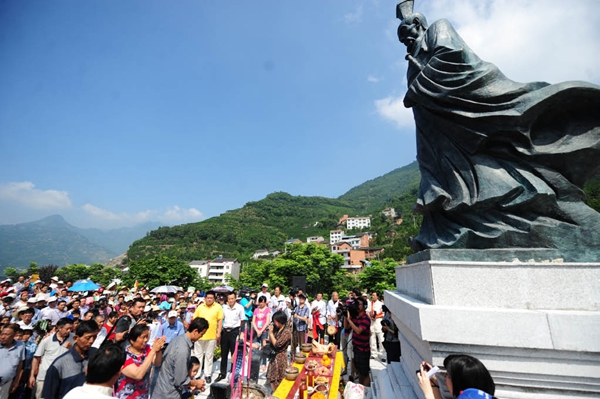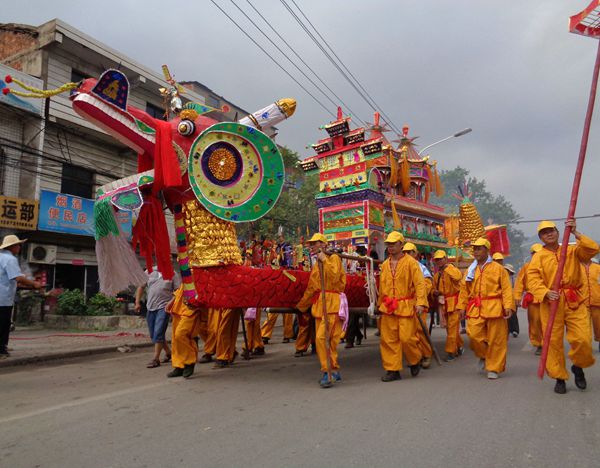Memorial Mores in Qu’s Hometown
Zigui, hometown of Qu Yuan, is where many popular Duanwu customs originated. It also preserves unique mores associated with the festival. Locals usually start preparations at the end of the fourth lunar month. During the fifth month, they hold three celebrations respectively on the fifth, the 15th, and the 25th days.
A local saying goes, “Duanwu is more important than Spring Festival, so wives should go back to their birth homes.” This relates to the legend of how, after Qu Yuan’s banishment, his sister also returned to their home town to comfort him. The name Zigui literally means the sister returns. The custom of married women journeying to their parents’ home for the festival with their husbands and children is still observed today.

A grand commemoration is held in front of the statue of Qu Yuan in Zigui, hometown of the great poet.
Lepingli, birthplace of Qu, is the locale of a club of farmer poets, the largest of its kind in China. Each Dragon Boat Festival its members take part in a contest that entails writing poems in the lisao (lament) style that Qu Yuan created. They recite their works in the local dialect and also sing them to local airs in homage to the great poet.
Dragon boat races are synonymous with the festival throughout the world. In Zigui, a unique calling rite is held ahead of the race. It relates to the tale of Qu’s sister who, upon hearing the grave news, set off in a boat along the river, wailing and calling her brother’s name over and over in efforts to recall his spirit. This calling home of the soul thus became a feature of the festival.
Residents of Zigui still throw zongzi into the river on Duanwu, in honor of the festival’s origins.
The celebration culminates in the evening of the 25th day, when villagers gather in the open country to dance, sing and perform lion dances, as well as to row “land boats” – a model boat used as a stage prop, until daybreak.
Boat of Gods Parade in Xisai
China’s longest Duanwu celebration is in Daoshifu, a village in the Xisai- shan District of Huangshi City, Hubei Province. It lasts for 40 days, from the kicking off of boat building on the eighth day of the fourth lunar month through to the 18th day of the fifth month. The core purpose of its activities is to ward off evil and plagues and pray for peace and health.

The boat of gods is the most eye-catching spectacle of the entire proceedings. The boat in question carries the likenesses of as many as 108 gods, so expressing local residents’ pantheistic belief and sincere devotions. They include gods that command life and death, saints such as Qu Yuan, and local deities such as the god of land, the god of water, the god of the 12 flowers, and the four gods of plagues. Locals begin fashioning paper likenesses of these celestials on the eighth day of the fourth lunar month.
Most important of the 108 gods is the Black Lord, whom locals regard as their patron saint. Sacrifices are made to him daily from the start of preparations, in expectations that he will collect all plagues and poisons in his waist pouch. The Black Lord and the other 107 gods are placed in the boat on the 15th day of the fifth lunar month.
At 8 am on the 16th day, locals carry the boat of gods past every dwelling in the village. Residents hang cattail and mugwort leaves on their gates, and place tables in front of their houses on which to burn incense and make offerings of wine, tea, rice, and fruit. As the boat approaches they set off firecrackers and pour tea and rice on the ground to express reverence.
On the evening of the 17th day, 48 lamps are lit for an all-night vigil. The next morning, 16 young adult males carry the boat to the river and let it drift east with the current, in hopes that all plagues, poisons, and bad elements will leave the village.
The boat of gods is highly reputed for its artistic content, manifest in the intricate bamboo weaving and painting skills prevalent in the middle reaches of the Yangtze River.
Dragon Boat Races in Miluo
Miluo City in Hunan Province observes customs that are distinct, mysterious, and rich in content. Participants in the festival, celebrated from the first to 15th day of the fifth lunar month, are denizens of the middle and lower reaches of the Miluo River. In addition to eating zongzi, hanging cattail and mugwort leaves on their doors, drinking realgar wine, and dragon boat racing, people here also observe esoteric rites like stealing the sacred log, carving the dragon head, making devotions to the dragon, and worshipping Qu Yuan.
The most dramatic activity is stealing a trunk to fashion into the dragon-shaped boat keel. Four “thieves” set out after dark to the keeper of the log’s house. Two hoist it on their shoulders, and the third ties a strip of red cloth around its middle. The fourth, hiding in front of the house, sets off fire crackers as his partners abscond. The owner, who actually feels happy and lucky, must then ostensibly give chase.
Carving the dragon head is also an arcane process. On the big day, the sculptor first bathes himself and burns incense before starting work on the carefully selected camphor wood. Others are strictly prohibited from the work area. After the dragon head is finished, it takes pride of place among other offerings and incense.
Making the dragon boat is less mystical, but its initiating rite, usually held at midnight, is restricted to carpenters and the main boatman. It can take a whole day, or no more than three days to complete the boat. The head carpenter receives a cash gift and a bucket of rice. Others work voluntarily, often providing their own tools and parts.
The boat is drawn to the river on the first day of the fifth lunar month. The day before, all barriers along the road are removed and people not involved in the ritual avoided. A young unmarried male carries the dragon head on his back, wades to the middle of the river and immerses the head in its water five times. He then swims back to the bank and installs the head on the boat. The scullers launch the boat on the river, jump in, and row to the temple dedicated to Qu Yuan, where they pay homage.
Exorcise Evil Spirits in Suzhou
Suzhou City of Jiangsu Province is located on the lower reaches of the Yangtze River. Duanwu customs are appropriate to local natural conditions and living habits, as well as economic and cultural characteristics.
The festival occurs right in the middle of a long rainy period. Plagues spread easily in this hot humid weather. To avoid pestilence and drive away poisonous insects, people hang cattail and mugwort leaves on their doors, burn incense sticks made of dried mugwort indoors, and spray lime water or realgar wine in corners and damp areas. Some parents smear realgar wine on their children’s foreheads and palms. Others wrap a piece of realgar in cotton or silk cloth and place it in their well to cleanse the water.
Realgar is a mineral substance that contains arsenic sulfide. According to traditional Chinese medicine, it heals scabs, sores, and snake and insect bites, so is widely used throughout the country.
In ancient times, people would place realgar in a small sachet to carry in summer as an amulet. Making sachets hence became an indispensable skill for women. In Suzhou, famous for embroidery, local women created various shapes of sachets and embroidery patterns, so making them an adornment. Children still often wear such sachets stuffed with herbal medicines to ward off diseases.
The sybaritic Suzhou cuisine renders festive foods even more toothsome. The most popular snack, zongzi, comes in various flavors according to the morsels added to their rice fillings. They include salty meat or ham, which makes them distinct from the less exotic zongzi of North China.
People in Suzhou generally dine in their own time. The Dragon Boat Festival is the time to enjoy the “five yellows” – five food ingredients that take the prefix “yellow” in Chinese. They are: yellow croaker, cucumber (yellow melon), rice field eel (yellow eel), realgar wine (yellow wine), and salted duck egg yolk (yellow yolk). Dining mores are the best example of the time-honored concept of life in China – human beings should adapt to and integrate with nature.
(Compiled and edited by China Today)
